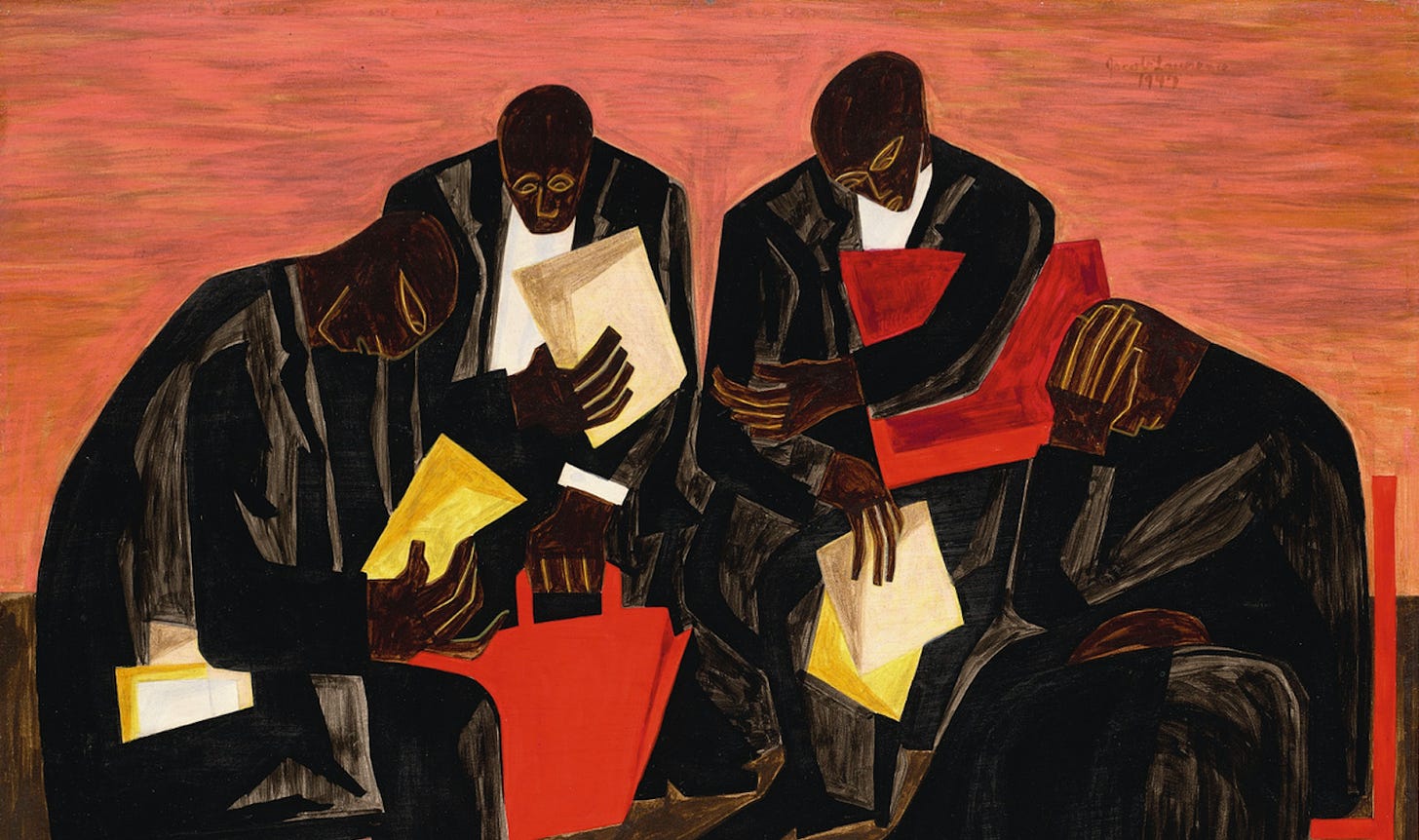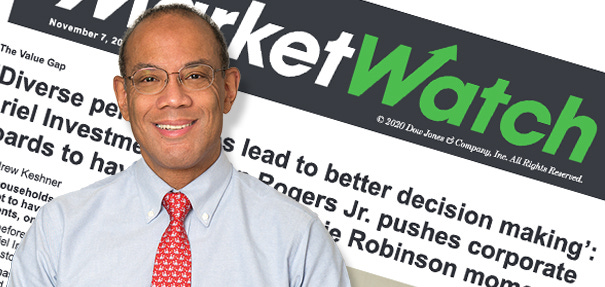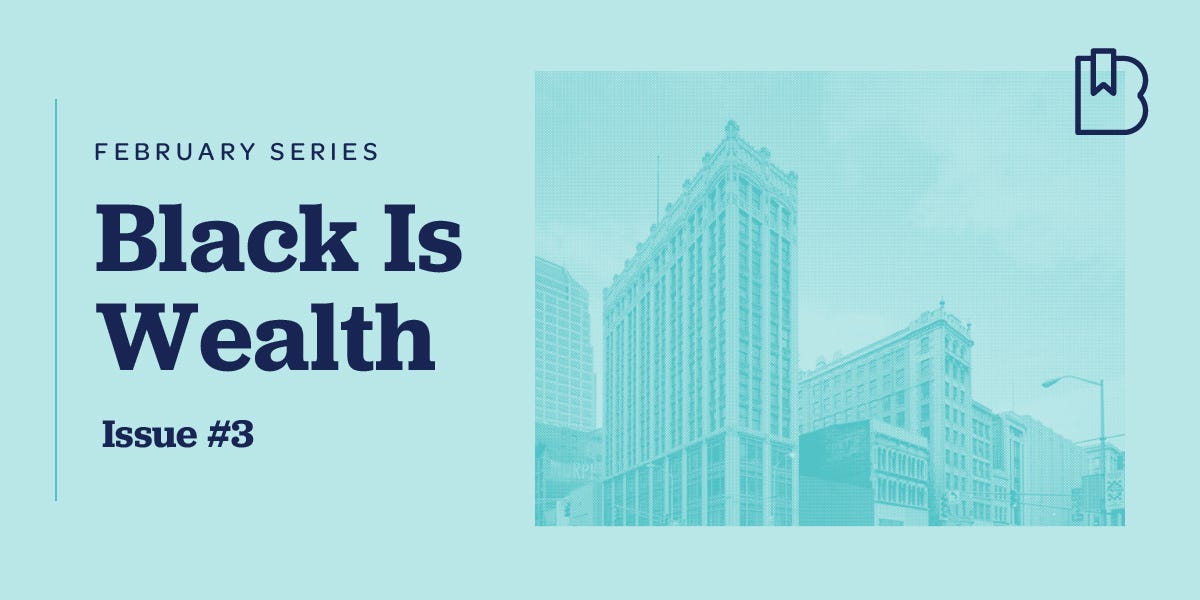Black Is Wealth
Karibu (welcome in Swahili) to issue #3!
We’re so happy to have you here. For any newcomers, Black To School explores the history and contributions of Africans and the African Diaspora to global society. Our goal is to learn from these stories, draw inspiration, and make a positive change in our own lives, homes, and communities.
Broadening our lens, we’re taking a close look at how Black leaders have built wealth in the corporate world. In this issue we’ll:
Learn about Black professionals who are leading powerful companies around the world, including Ariel Investments, one of the largest Black-owned money management firms with over $15 Billion in assets.
Share ideas on how you and others can build wealth through senior management and contracting opportunities.

Meet the Captains of Industry
Contributor: Michael Lutterodt Quarcoo Amaning
Now that you know the story of Black Wall Street (issue #2), it won’t come as a surprise that our long history of wealth building extends beyond the US Main Street and the UK High Street and into the corporate world. Senior executives and C-Suite members are easily making high six-figure and up salaries that allow them to build generational wealth.
In the US, between our roles as board directors, suppliers, and managing directors, Black people are among the highest performing executives. However, there is still much ground to cover in America as Black people represent less than 1% of Fortune 500 CEOs.
Over in the United Kingdom, where I live, more work is also needed in increasing diversity at the executive level. A June 2020 article from the Guardian highlighted how UK Black professional representation “has barely budged since 2014,” with only 1.5% of top positions held by Black people, and zero Black leaders at the top 100 UK-listed companies.
Whether it be the US or the UK, there is still much progress to be made. The road to advancement in large companies has its challenges, especially for Black professionals. So what actions can we take in order to make a change?
One of the single most powerful things corporate workers can do is sponsor Black professionals.
When we serve as a sponsor (rather than just a mentor) for Black colleagues, vendors, professional service providers, and the next generation, we invest social capital that pays big dividends for ourselves, clients, shareholders, and society.
Relationships matter: who we vouch for influences who advances and how far they go. One of the best ways to study the practice of executive sponsorship in corporate America is through the example of Ariel Investments, one of the largest African American-owned money management firms in the world.

Ariel Investments
After the passage of the Civil Rights Act of 1964, the Equal Employment Opportunity Commission (EEOC) was formed as a “watchdog” against all forms of employment discrimination, including race. As a direct result, between 1966 and 2013, the percentage of African American corporate managers in companies rose from 1% to 7%. Benefitting from the impact of the Civil Rights Act, many African Americans achieved great success in corporate America.
Among the group of Black professionals who entered the workforce in the following years was John Rogers, a talented Black stockbroker and the grandson of J.B. Stradford, one of the founders of Black Wall Street (listen to him talk about his grandfather). He created his own money management firm called Ariel Investments.
Since the very beginning, Ariel not only consistently delivered superior returns for clients, but also modelled a Black wealth building playbook for the corporate community. Ariel’s practice is simple and non-negotiable: diversify people, purchasing, and philanthropy (3Ps). At its core, this approach is about the sponsorship of leadership and contracting opportunities for Black professionals and suppliers. This approach has been key to Ariel’s success and is now the go-to guide for the industry.
As a prominent firm with over $15 Billion in assets under management, Ariel Investments has a long history of progressive action in the industry. They persuaded 45 portfolio companies “to have their Jackie Robinson moment” and add their first diverse board member. Ariel has also inspired countless companies to make both their leadership teams and supply chains reflect their customer base.
So, Where Are We Now?
At the highest rung of the corporate ladder, we have had 19 Black CEOs of Fortune 500 companies and currently have 300+ C-Suite executives of major corporations. Additionally, over 300 board directors serve on the S&P 500, and we represent 10% of newly appointed directors each year. As a result of the widespread Black Lives Matter protests of the previous year, a new spotlight is shining on the decades of groundwork by Ariel Investments, and a great many others, in the pursuit of racial equity.
In just five months, 130 Black board members were added to Russell 3000 companies (a 240% increase), and 2,000 CEOs of some of the largest companies have pledged action (and will be held accountable). The investment community, including Goldman Sachs, BlackRock, Vanguard Group, and State Street Global Advisors, have communicated that they will cut ties with companies that do not demonstrate board diversity.
The State of California has successfully passed a mandatory racial diversity bill. Nasdaq, along with legislators in Illinois, New York, and other states, are pursuing policies to mandate targets and/or disclose leadership diversity. There is more work to be done, but the power of sponsorship that Ariel Investments exemplifies has forever made the business case for change in the private, public, and independent sectors.
🛠️ The Black To School Toolkit
Now What? Dig Deeper with Friends, Family, and Others.
Want more on Ariel’s Black wealth building practice? Meet John Rogers’ partner at Ariel Investments, Mellody Hobson. Here’s her TED Talk on how you can advance this agenda at work. Want some specifics? Here is a detailed Q&A with Mellody on how to reward sponsorship.
Interested in learning directly from captains of industry? Dennis Owusu Sem runs Success Talks, which shares gems from business leaders.
Curious on how to attract a sponsor? There’s no silver bullet, but here are some promising stories, and here are must-dos to get sponsorship. Look within your company and industry for sponsors. If you’re currently a manager, consider joining and getting a sponsor in the Executive Leadership Council.
Passionate about joining a corporate board? Many top business schools now have board director training. In the UK, Olmec provides training and shares notices about board positions across industries. If you’re in the US, this one is for you.
Looking to connect and learn with like minded individuals? Sign up for Gravy and join a conversation about how to get tapped for a corporate board with Anddria Varnado (Umpqua Bank) and Claire Cormier Thielke (Zillow).
Are you a Black business owner? If so, you have the opportunity to access contracts with new clients through this organization in the US and this one in the UK. Get registered as a minority-owned business and connect with large companies and government agencies.
What’s the call to action for existing board members? Use your voice and speak up on the board to ensure CEOs prioritize diversity. Check out these 20 lessons learned from existing Black board directors, compiled by Barry Lawson Williams.
Not convinced that we still have work to do? Check out this article by Harvard Researcher Chu Wang, on why the business case for diversity is not enough. For a longer read, purchase Diversity Inc by Pamela Newkirk, an award winning journalist and author.
⌛ The Black To School Timeline
Black Wealth Comes from Sponsorship for Leadership and Contracting Opportunities Within Corporate America.
We began by doing some exploring in the Middle Ages (over 700 Years Ago) The Person: Mansa Musa, King of Mali, whose fortune is valued at $400 Billion (in today’s dollars), cornered the market for gold, made Timbuktu a global commercial center, and, as a result, Mali was added to the world map.
Last week, we looked into the Late 19th/Early 20th Century Period (nearly 150 Years Ago) The Place: Black Wall Street, a town founded in 1906, which at its peak had over 10,000 residents, hundreds of Black entrepreneurs, and thousands of professionals. Together, they were the wealthiest, self-sustaining Black community in the Western world.
This week, we took a look at the Contemporary Period (within the last 30 Years) The Practice: Ariel Investments, led by the dynamic duo John Rogers & Mellody Hobson. With nearly $15 Billion in assets, Ariel is the largest majority Black-owned investment firm in the world. They build diverse corporate boards, executive teams, and suppliers that produce high long term returns for shareholders and society.
Next week, we’ll see what’s going on in the present day (here and now) The Plan: Personal Finance Influencers. These Black “Money Mavens” have achieved financial freedom and travel the world sharing what they have learned. They have it all - the right mindset, the trust of the masses, and a sustainable way to make money work for them.
About This Week’s Contributor
Michael Lutterodt-Quarcoo - Founder of A Tribe Called Progress
Michael has over 11 years experience in African Affairs having worked in government, the third sector, and business. He has lived, worked, or visited over 16 African countries and has developed a deep interest in accelerating the progress of Black communities around the world.
As a result of the racial inequalities he saw in countries like the US, UK, Mauritania, and Madagascar, he founded A Tribe Called Progress (ATCP) with the goal of tackling the issues keeping Black communities from fulfilling their potential through education, empowerment and allyship. He is a key believer of transforming community-led organizations into sustainable institutions capable of protecting and providing the resources required to ensure Black excellence.
Michael is also an international conference host & moderator, and he has hosted events for the President and Vice President of Ghana and the Commonwealth and Duke of Sussex. You can keep up with him using the links below:
Learn from the next ATCP Masterclass - African’s Discovery of America Feb 26th
Listen to his podcast - The Grit
Join him on Instagram - @atcp_co
About Black To School
Black To School is a collaborative volunteer effort focused on sharing Black history, collecting helpful resources, and creating a safe space for discussion. Learn more about us here and join our Slack community to keep the conversation going. All are welcome!
If you’re passionate about this type of work and want to help out, please let us know! The best way to get in touch is by emailing info@blcktoschool.com with “volunteer” as the subject, or by joining our Slack community and sharing that you’d like to be involved.





